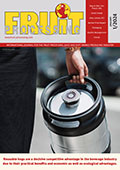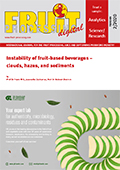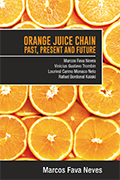Silk Keeps Fruit Fresh Without Refrigeration
Half of the world’s fruit and vegetable crops are lost during the food supply chain, due mostly to…
Half of the world's fruit and vegetable crops are lost during the food supply chain, due mostly to premature deterioration of these perishable foods, according to the Food and Agriculture Organization (FAO) of the United Nations.
Tufts University biomedical engineers have demonstrated that fruits can stay fresh for more than a week without refrigeration if they are coated in an odorless, biocompatible silk solution so thin as to be virtually invisible. The approach is a promising alternative for preservation of delicate foods using a naturally derived material and a water-based manufacturing process.
Silk's unique crystalline structure makes it one of nature's toughest materials. Fibroin, an insoluble protein found in silk, has a remarkable ability to stabilize and protect other materials while being fully biocompatible and biodegradable.
For the study, researchers dipped freshly picked strawberries in a solution of 1 percent silk fibroin protein; the coating process was repeated up to four times. The silk fibroin-coated fruits were then treated for varying amounts of time with water vapor under vacuum (water annealed) to create varying percentages of crystalline beta-sheets in the coating. The longer the exposure, the higher the percentage of beta-sheets and the more robust the fibroin coating. The coating was 27 to 35 microns thick.
The strawberries were then stored at room temperature. Uncoated berries were compared over time with berries dipped in varying numbers of coats of silk that had been annealed for different periods of time. At seven days, the berries coated with the higher beta-sheet silk were still juicy and firm while the uncoated berries were dehydrated and discolored.
Tests showed that the silk coating prolonged the freshness of the fruits by slowing fruit respiration, extending fruit firmness and preventing decay.
"The beta-sheet content of the edible silk fibroin coatings made the strawberries less permeable to carbon dioxide and oxygen. We saw a statistically significant delay in the decay of the fruit," said senior and corresponding study author Fiorenzo G. Omenetto, Ph.D. Omenetto is the Frank C. Doble Professor in the Department of Biomedical Engineering and also has appointments in the Department of Electrical Engineering and in the Department of Physics in the School of Arts and Sciences.
Similar experiments were performed on bananas, which, unlike strawberries, are able to ripen after they are harvested. The silk coating decreased the bananas' ripening rate compared with uncoated controls and added firmness to the fruit by preventing softening of the peel.
The thin, odorless silk coating did not affect fruit texture. Taste was not studied.
"Various therapeutic agents could be easily added to the water-based silk solution used for the coatings, so we could potentially both preserve and add therapeutic function to consumable goods without the need for complex chemistries," said the study's first author, Benedetto Marelli, Ph.D., formerly a post-doctoral associate in the Omenetto laboratory and now at MIT.
Other authors on the work were Mark A. Brenckle, Ph.D., former research assistant in the Omenetto Laboratory, now at Columbia University, and David L. Kaplan, Ph.D., Stern Family Professor of Engineering, Tufts University. Kaplan also holds Tufts faculty appointments in the Department of Chemical and Biologicall Engineering, School of Medicine, School of Dental Medicine and Department of Chemistry in the School of Arts and Sciences.
Work was supported by a grant from the Office of Naval Research (N00014-13-1-0596). Marelli, B. et al. Silk Fibroin as Edible Coating for Perishable Food Preservation. Sci. Rep. 6, 25263, doi: 10.1038/srep25263 (2016)
Located on Tufts' Medford/Somerville campus, the Tufts University School of Engineering offers a rigorous engineering education in a unique environment that blends the intellectual and technological resources of a world-class research university with the strengths of a top-ranked liberal arts college. Close partnerships with Tufts’ excellent undergraduate, graduate and professional schools, coupled with a long tradition of collaboration, provide a strong platform for interdisciplinary education and scholarship. The School of Engineering’s mission is to educate engineers committed to the innovative and ethical application of science and technology in addressing the most pressing societal needs, to develop and nurture twenty-first century leadership qualities in its students, faculty, and alumni, and to create and disseminate transformational new knowledge and technologies that further the well-being and sustainability of society in such cross-cutting areas as human health, environmental sustainability, alternative energy, and the human-technology interface. For more information, visit http://engineering.tufts.edu.









